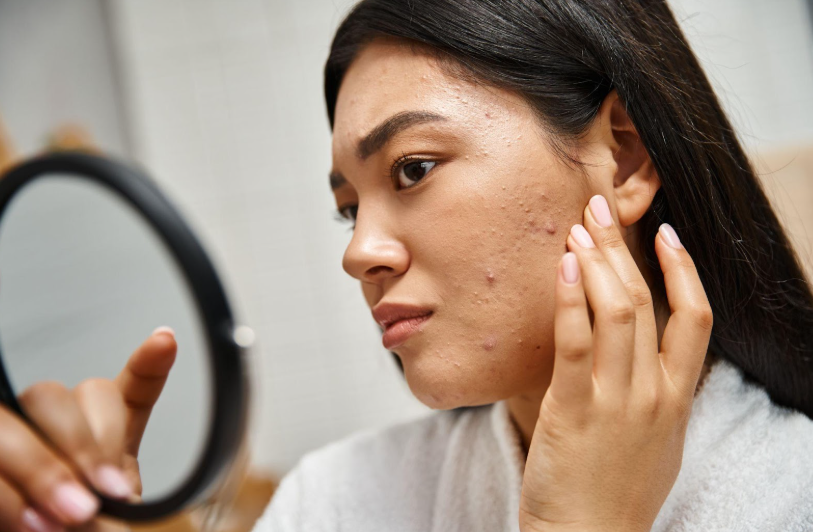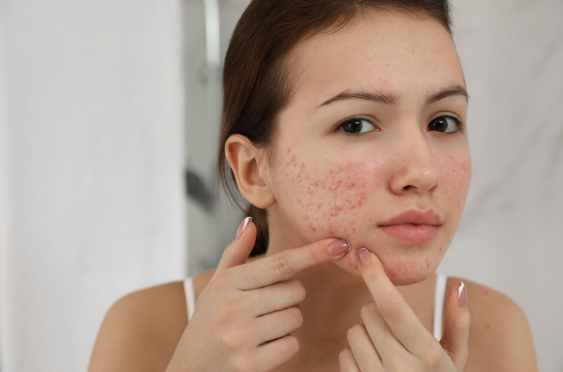At Pine Belt Dermatology & Skin Cancer Center we see a ton of psoriasis in south Mississippi. Psoriasis is an extremely complex disease that is very difficult to manage on your own. For patients with moderate to severe psoriasis there are not very many over-the-counter options to help you keep your condition under control. If you are suffering from psoriasis, you know all too well that when it comes to the disease there is very little that is truly under your control. Most of the time you find that you are at the mercy of your condition. However, there is good news! There is one thing that you are in complete control of that, if changed, can help you manage your psoriasis – what you eat!
Psoriasis is a chronic auto-immune cutaneous disease associated with inflammation. It is an extremely complex disease with contributing factors such as genetics, smoking, diet, alcohol use, and stress all believed to play a major role in its appearance and severity. Other factors, including increased body mass index and weight gain, have been associated with a higher prevalence of psoriasis and are considered to be additional risk factors for the disease. Patients with psoriasis also are at increased risk for anxiety and depression. Because psoriasis is a chronic disease that is inflammatory many patients seek alternative therapies and lifestyle modifications in order to supplement or augment their doctor’s prescribed treatment. There have been a number of studies recently published that discuss the importance of a healthy diet when dealing with psoriasis. Most of the readily available literature reveals that most diets have mixed impacts on psoriasis, though some individual foods may contribute to better managing the disease. Foods and other dietary supplements that have anti-inflammatory effects seem to have a higher chance of improving psoriasis symptoms. The wonderful part about establishing a healthy diet in order to manage your psoriasis is that it is completely within your control to change!
A survey done in 2017 of over 1,200 patients with psoriasis found that 86% of respondents reported modifying their diets. Additionally, 40% of those respondents reported switching to a specialized diet in order to improve their psoriasis. The three most common diets reported were gluten free, low carb/high protein, and Paleolithic diets. Reductions in consumption of alcohol gluten, nightshades, and junk foods were associated with improvements in 50% of psoriasis patients. The remainder of the blog will discuss a number of specific diets and how they can help patients better manage their psoriasis.
- Gluten- Free: Celiac disease is an inflammatory condition caused by an immune reaction to the protein gliadin, which is often found in foods containing gluten. There are a number of studies that reported an association between having celiac disease and psoriasis. A 2017 study found a 3-fold increased risk of celiac disease for patients with psoriasis. Celiac disease causes malabsorption of nutrients and can lead to a Vitamin D deficiency, which is a known contributing risk factor for psoriasis. There are also hypotheses that both diseases involve common immune cells, or that there may be a shared genetic background between the two diseases. Either way, these commonalities would explain why such a large proportion of psoriasis patients find gluten-free diets help them better manage their psoriasis. Gluten-free diets are a great way to reduce the triggering of inflammatory effects that are experienced in psoriasis flares.
- Mediterranean: this diet is often cited as a great supplement to psoriasis therapies. The Mediterranean diet consists mainly of nuts, fruit, vegetables, legumes, cereals, and olive oils while restricting consumption of red meats, dairy products, and alcohol. On an unrelated note: this diet is associated with a decreased risk of a number of health conditions including cardiovascular disease, rheumatoid arthritis, Crohn disease, and many others. The reason this diet is beneficial for people with a number of health conditions, including psoriasis, is because it contains a high proportion and a wide variety of foods with anti-oxidants and anti-inflammatory compounds. Like we learned earlier in the post, diets that are anti-inflammatory reduce the risk of psoriasis severity. A rather large survey done in 2015 with over 3,500 participants with psoriasis found that respondents who reported lower severity also reported higher adherence to variants of the Mediterranean diet.
- Vegetarian: Both vegetarian and vegan diets have been evaluated in multiple studies on their effects on patients with psoriasis. A relatively recent study observed improvements in psoriasis patients that switched their diets to vegetarian. These diets have been shown to be associated with higher ratios of anti-inflammatory foods than omnivorous diets. The assumption is that the largely anti-inflammatory consumption in the diet is why people suffering from psoriasis would benefit from switching to a vegetarian diet. Vegetarian diets also tend to contain vast quantities of potassium, which is used in the body to synthesis cortisol, which is commonly used to treat psoriasis. Both hypotheses explain why vegetarian diets help better manage psoriasis, although further studies should be done to compare vegetarian diet results to the other commonly suggested ones.
- Ketogenic: Obesity and weight gain are known factors associated with psoriasis, and because of this some psoriasis patients will turn to diets that restrict calories with the goal of losing weight. There was a study in 2015 that studied a patient who restored her response to systemic therapy following an intensive 4-week ketogenic diet. The ketogenic diet is a high fat, adequate protein, low carb diet. As is the common trend among the various diets listed in this blog, the ketogenic diet has shown to have anti-inflammatory effects. While the 2015 case study is intriguing, there need to be more large-population studies to determine if the diet has a significant association with psoriasis improvement. The studies that have been published have either been case studies, or studies that did not a have enough participants to be truly statistically significant.
- Complete dietary shifts are not always feasible for patients. In this case, many psoriasis patients turn to dietary supplements as an alternative method to lifestyle change that will improve their condition. Two of the prominent nutritional additives that are easy to implement are fish oils and vitamin D. Vitamin D plays an important role in regulating calcium and magnesium as well as maturation of keratinocytes in the skin. This is why topical vitamin D analogues are common treatments for psoriasis. There are many psoriasis patients who are found to have vitamin D deficiencies that contribute to their flare ups. Another supplement that can be added is polyunsaturated fatty acids found in fish oil. There are a number of trials that show improvements in psoriasis severity. Both of these supplements can be added with relative ease to a person’s diet to help them manage their condition.
Dietary modifications have a complex effect on psoriasis. A dietary change will not make your psoriasis disappear, and how effective the dietary change depends on the variations of psoriasis and the overall lifestyle of the patient. Lifestyle habits that influence the efficacy of dietary changes’ help with managing psoriasis include level of exercise, activities such as smoking and drinking, obesity, and genetic susceptibilities to other conditions or comorbidities. However, literature appears to illustrate that certain foods and nutritional supplements can be modified from all diets for general improvement of the condition. If you have psoriasis, for the most optimal management of the condition, you should still seek counsel from one of our very experienced providers at Pine Belt Dermatology & Skin Cancer Center.











